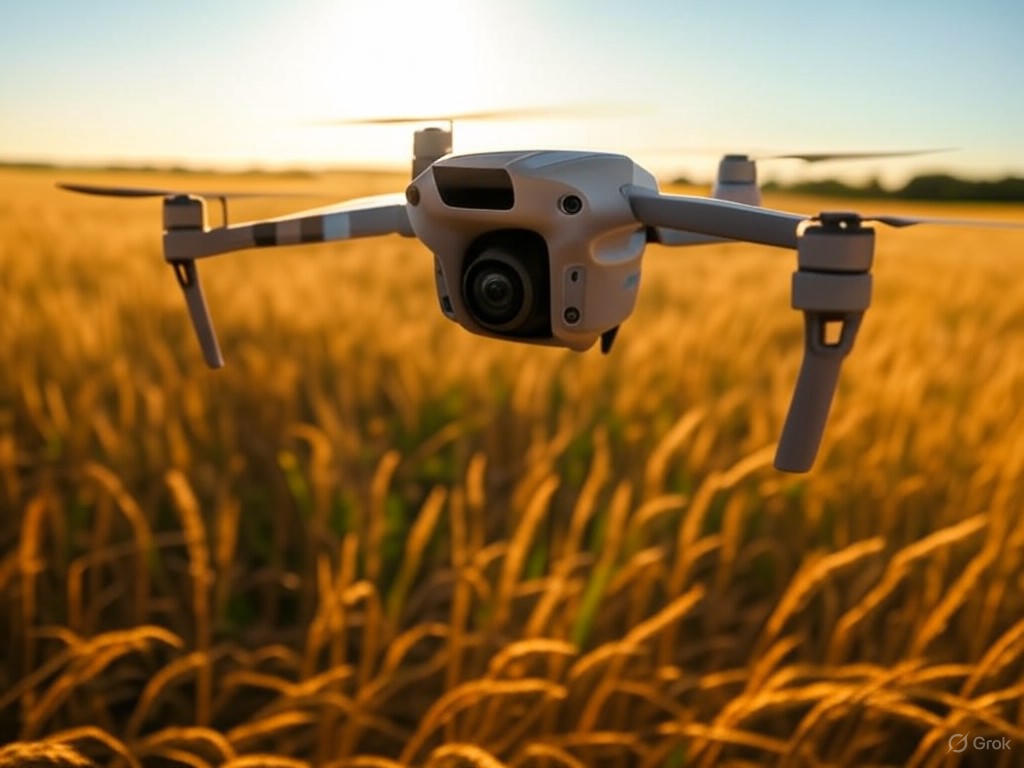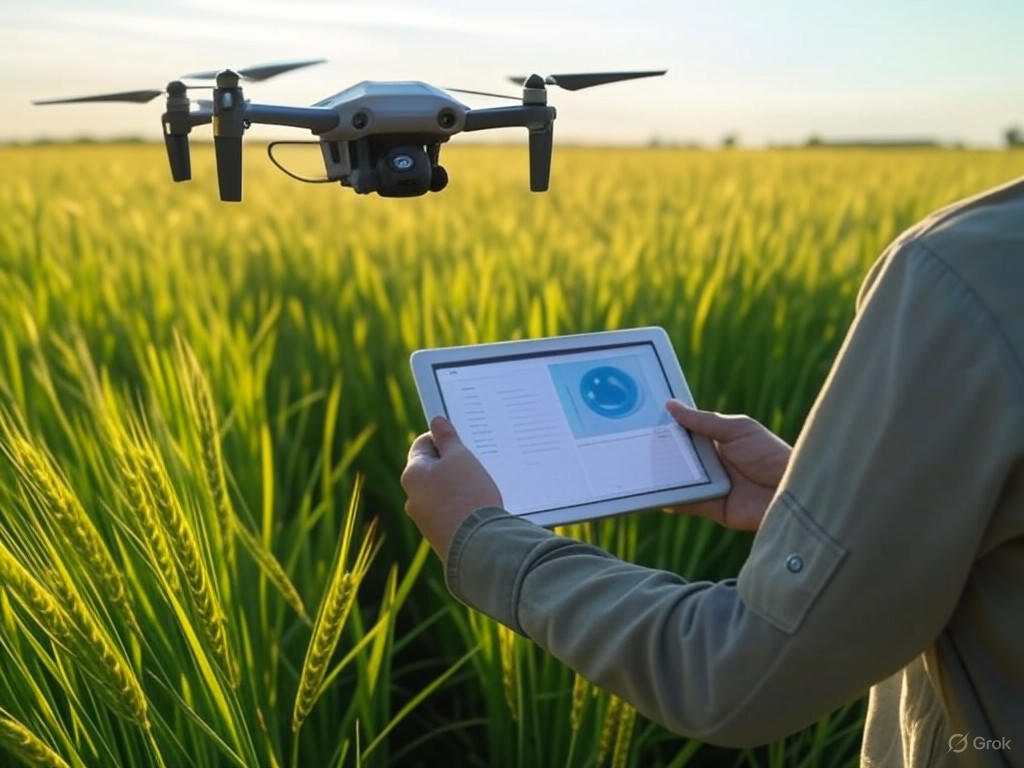AI in Agriculture: Smart Farming Solutions
In an era where the global population swells like an overripe harvest, the ancient art of farming finds itself at a crossroads. Once, our forebears tilled the soil with little more than calloused hands and a prayer to the heavens, their successes measured by the capricious turn of seasons. Today, however, the intrusion of artificial intelligence (AI) into agriculture promises not mere survival, but a symphony of efficiency and abundance. As Joanna Aucton, I must confess a certain delight in this modern marvel, for it exemplifies the triumph of human ingenuity and free-market innovation over the meddlesome hand of government intervention. Yet, let us not be blinded by the gleam of technology; we must examine how AI optimizes farming to bolster global food security, all while championing sustainability and traditional values of stewardship and productivity.
This narrative is not one of utopian fantasy but of pragmatic progress. AI, with its algorithms and data-driven precision, is transforming vast farmlands into smart, self-optimizing ecosystems. In a world where free markets reward innovation, companies are racing to deploy AI solutions that enhance crop yields, reduce waste, and ensure that the bounty of the earth reaches tables far and wide. Far from the heavy-handed regulations that might stifle such advancements, these developments underscore the power of private enterprise to address pressing challenges like food insecurity without resorting to bureaucratic dictates.
The Dawn of Smart Farming: AI as the Farmer's Ally
Picture, if you will, the sprawling fields of the American Midwest, where golden waves of wheat once danced at the mercy of rain and rot. Now, AI-powered drones and sensors hover like vigilant sentinels, analyzing soil moisture, nutrient levels, and pest infestations with unerring accuracy. This is not the stuff of science fiction but the reality of smart farming, where technology marries tradition to produce more with less. By integrating AI into irrigation systems, for instance, farmers can optimize water usage, ensuring that precious resources are allocated efficiently rather than squandered in excess. Such innovations not only boost productivity but also promote sustainability, aligning with the timeless ethic of responsible land stewardship that has long defined rural communities.

An AI-equipped drone glides over a Midwestern farm, capturing real-time data on crop health to prevent losses from pests and drought.
The free-market ethos drives this transformation. Companies like John Deere have pioneered AI-integrated machinery that automates planting and harvesting, reducing labor costs and minimizing human error John Deere's AI Farming Solutions. According to a report from the Wall Street Journal, these advancements could increase global agricultural output by up to 70% by 2050, all without the need for expansive government subsidies that often distort market dynamics Wall Street Journal on AI's Agricultural Boom. In this light, AI stands as a testament to how limited government interference allows entrepreneurs to flourish, fostering an environment where innovation serves the greater good.
Evidence of Efficiency: Data-Driven Gains in Yield and Sustainability
To appreciate the full scope of AI's impact, one must delve into the evidence, where numbers and narratives converge. In regions plagued by food insecurity, such as sub-Saharan Africa, AI applications are proving instrumental in predictive analytics for weather patterns and crop diseases. For example, machine learning models can forecast droughts weeks in advance, enabling farmers to adjust planting schedules and conserve resources. This is not mere speculation; studies from IEEE highlight how AI-driven precision agriculture has reduced chemical fertilizer use by 20–30% in pilot programs, directly contributing to more sustainable practices IEEE Spectrum on AI in Sustainable Farming.
Consider the economic ripple effects: By enhancing efficiency, AI helps smallholder farmers in developing nations compete in global markets, without relying on welfare-style interventions. A blog from AgFunder, a leading voice in agricultural technology, details how AI platforms like those from Climate Corporation (now part of Monsanto) use satellite imagery to optimize planting, resulting in yield increases of up to 15% AgFunder on AI for Small Farms. These gains underscore a center-right principle: that free-market solutions empower individuals and communities, preserving traditional values of self-reliance and hard work while addressing modern challenges.
Yet, balance demands acknowledgment of potential pitfalls. As AI proliferates, concerns about data privacy and over-dependence on proprietary technology loom large. In a free-market system, these issues are best resolved through competition and consumer choice rather than regulatory overreach. After all, history shows that when governments impose heavy controls, innovation falters, as seen in past agricultural policies that led to inefficiencies and shortages. Instead, we should celebrate how AI fosters a merit-based economy, where the most effective technologies rise to the top.

Farmers review an AI dashboard displaying real-time data on soil health and crop yields, enabling data-driven decisions for sustainable harvests.
The Path Forward: Embracing Innovation with Caution and Conviction
As we conclude this examination, it is clear that AI's integration into agriculture represents a beacon of hope for global food security. Through smart farming solutions, we witness the harmonious blend of technology and tradition, where AI enhances rather than supplants the farmer's role. This progress, driven by private innovation, aligns with center-right ideals: promoting economic freedom, rewarding efficiency, and upholding the dignity of labor without the entanglement of excessive government oversight.
In advocating for this path, I urge policymakers to tread lightly, favoring frameworks that encourage investment in AI while resisting the temptation to micromanage. After all, as Jane Austen might quip, it is the quiet industriousness of the individual that often yields the most fruitful results, not the grand designs of distant authorities. Let us, therefore, embrace AI in agriculture not as a panacea, but as a wise ally in our enduring quest for abundance and sustainability.

